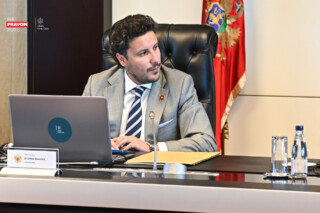U.S. Senate Democrats required President Donald Trump’s administration to treat foreign meddling in elections as national crisis, to form an agency for coordinating response and to set up a new kind of sanctions for swift punishment of the accountable.
The representative of the Democrats in the Committee on Foreign Relations published a 206 page report based on research and consultations with foreign governments that were targeted by the Kremlin. They warned that Russian operations to undermine democracy extend far beyond U.S. elections and accused President Donald Trump of failing to confront the threat.
“Never before has a U.S. president so clearly ignored such a grave threat, and a growing threat, to U.S. national security,” said the top Democrat on the Senate Foreign Relations Committee, Ben Cardin of Maryland, adding that, unless action is taken, Russian interference will mar American elections this year and in 2020.
Cardin released the report prepared by the committee’s Democratic staff members that accused Russia of mounting a protracted assault on democracy at home and abroad.
“Putin’s regime has developed a formidable set of tools to exert influence abroad and appears intent on using almost any means possible to undermine democratic institutions and trans-Atlantic alliances,” the report said.
The committee’s Republican chairman Bob Corker did not sign off on the minority report, but did not immediately contest its findings.
The report detailed steps European nations have taken to combat Russian influence, both individually and within organizations such as NATO and the European Union. The United States, it contended, lags far behind.
“President Trump has been negligent in acknowledging and responding to the threat to U.S. national security posed by Putin’s meddling,” the report said. “The president should immediately declare that it is U.S. policy to counter and deter all forms of the Kremlin’s hybrid threats against the United States and around the world. … The president should also present to Congress a comprehensive national strategy to counter these grave national security threats.”
The report contains more than 30 recommendations for preventing further meddling in elections in Europe, the USA and other countries.
The recommendations include building democratic institutions in the countries that are the most vulnerable to meddling in elections and establishing an organisation similar to the National Centre for Fighting Terrorism which would coordinate US response to this kind of meddling.
Also, Washington and its allies are required to expose and freeze Kremlin-linked dirty money and make public any intelligence related to Putin’s personal corruption and wealth stored abroad.
The report cites Serbia and Montenegro as examples of Russian meddling.
It says that Russian malign influence in Montenegro has long been present and intensified in 2016 in an effort to derail the country’s NATO bid.
“This renewed focus included propaganda, support for NGOs and political parties, and culminated in an alleged Russian effort to overthrow the government following the 2016 parliamentary election. While Russia was strongly opposed to Montenegro’s desire to join NATO, it did not resort to the conventional military tactics used in Ukraine and Georgia, but instead relied on a hybrid mix of disinformation and threat of force to send the same message that integration with the West was unacceptable,” the report adds.
The report also mentions attempted coup plot in Montenegro on 16 October. The purpose of the coup plot was to create such discord in Montenegro that its NATO bid, or any prospects for integration with Europe, would be disrupted.
“This coup attempt, however, was not a one-off event, but the culmination of a sustained propaganda and interference campaign to persuade the Montenegrin people to oppose NATO membership,” US Senate researchers say.
Soon after Montenegro announced its intention to join NATO, Russia unleashed a propaganda campaign that included support for pro-Russian political parties and the cultivation of anti-NATO civil society groups.
“The Democratic Front (DF) political party, believed to have received millions of dollars in Russian support, has grown from being a marginal force into Montenegro’s main opposition party. The DF was very active throughout the debate on NATO, which sometimes resulted in violence. For example, activists from the DF were behind a demonstration in October 2015 which led to clashes with police. Propaganda also flowed freely through Sputnik and the pro-Russia web portals in4.net, and Russia reportedly directed resources to the non-governmental organizations ‘NO to War, NO to NATO’ and the ‘Montenegrin Movement for Neutrality’ to push back publicly against NATO accession,” the report says.
It adds that Montenegro’s NATO membership at this time has outsized importance, as it shows other NATO aspirants that it is possible to stand up to Russian government pressure and propaganda efforts and integrate with the West.
The Montenegro case shows how far the Russian government was willing to go in order to stop a country’s membership in the Alliance—it should serve as a wake-up call for other NATO and EU aspirants, especially in the Balkans.
Montenegro is advised to remain vigilant, since “Moscow could continue to exert pressure and influence in ways similar to those seen in countries like Bulgaria”.
“The international community should not rest on its laurels now that Montenegro is a NATO member, but should actively help the government to bolster its defences against other soft power tools in Russia’s asymmetric arsenal,” the report says.
NATO is required to take heed and require a series of reforms by aspirant countries directly focused on building resiliency against threats from the Russian government’s asymmetric arsenal.
Russia should never get a veto over the decisions of NATO, and the Alliance should be willing to accept any country which meets the membership requirements and has support from its citizenry.




